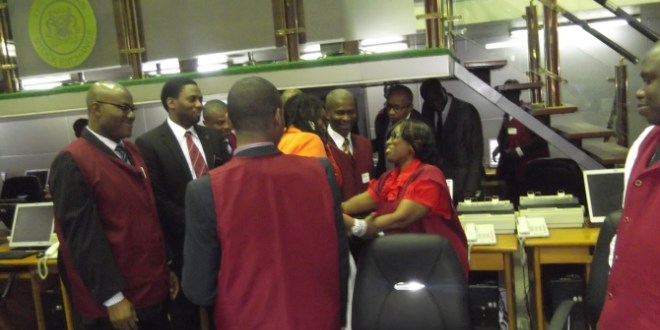The participation of foreign investors in the Nigerian Stock Exchange fell by 15 per cent between January and February this year, data from the NSE showed.
The NSE had put the level of participation by the foreigners at 51.57 per cent for January 2016. But the latest data released by the Nigerian bourse showed that for February 2016, the number dropped to 36.48 per cent.
Despite the fall in foreign portfolio investment at the Exchange, total transaction (comprising domestic and foreign portfolio investments) increased to N117.27bn in February, from N84.10bn in January.
Foreign portfolio investments for the period fell to N42.78bn while foreign inflows also dropped to N10.94bn from N17.01bn.
In the same vein, foreign outflow rose in February to N31.84bn from N26.36bn for January.
The NSE also recorded growth in domestic retail equity deals. The figure rose to N36.24bn in February from N18.88bn in January.
Investments by domestic institutions also rose to N38.25bn in February from N21.85bn the previous month.
The institutional composition of the domestic market increased by 75.05 per cent, and according to the Exchange, this indicated that institutional investors slightly outperformed their retail counterparts in the period under review.
In 2013, there was a major rebound in the domestic component which led to an almost equal split in foreign against domestic transactions.
This led to a drop in 2014 when the FPI outperformed domestic transactions.
In 2015, FPI dropped compared to 2014. However, it slightly outperformed domestic transactions in the same period.
The dwindling returns in the country’s stock market caused foreign portfolio investors to pull out N410.49bn from the equities segment of the NSE between January and August last year.
Just as was the case in 2014, foreign investment outflow exceeded inflow in the first eight months of 2015.
Foreign investors had pulled out N846.53bn from the stock market in 2014 although they invested N692.39bn, a development that caused the NSE All-Share Index to close with a negative return of -16.14 per cent.
The market is dominated by foreign investors. They accounted for 57.52 per cent of total transactions in 2014.
In the first eight months of 2015, foreign investment inflow was N367.10bn, which was N43.39bn less than outflow.
Despite the reported exit of many foreign investors from the stock market and expectations that domestic investors would take advantage of low stock prices, foreign investors still dominated the market, accounting for 54.36 per cent of the N1.430tn transactions in equities as of August.
Further review of the participation statistics showed that foreign portfolio investment outflow exceeded inflow in six of the eight months under consideration.
Inflow exceeded outflow in April 2015, as investor confidence rose after the peaceful conduct of the presidential election, and in June following the change in government. Year-to-date, the NSE All-Share Index has a negative return of -12.40.
The N1.430tn transactions recorded in the equities segment of the NSE in the first eight months of 2015 was, however, 5.8 per cent or N88bn lower than the N1.518tn transactions recorded in the same period of 2014.
The Director-General of the Securities and Exchange Commission, Mr. Mounir Gwarzo, had promised that the commission would work hard to attract more investment and encourage more Nigerians to participate in the capital market.
According to him, the commission will ensure that the market remains vibrant in order to attract local and international investors.
He was quoted as saying, “We will step up to reach out to the market and improve investment. On the international side, what is most important is the enabling environment. Right now the rules are very friendly and that is why we keep changing them from time to time to suit best practices and attract investors.
Mounir also emphasised the need for investor education both for retail and institutional investors as a means to improve the level of investment from the domestic investors.
The Chartered Institute of Stockbrokers had lamented that over 60 per cent of the Nigerian stock market was controlled by foreign investors. He said the situation was a major cause for concern.


 Forex2 weeks ago
Forex2 weeks ago


 Naira2 weeks ago
Naira2 weeks ago
 Naira4 weeks ago
Naira4 weeks ago
 Company News4 weeks ago
Company News4 weeks ago
 Billionaire Watch1 week ago
Billionaire Watch1 week ago




 Naira2 weeks ago
Naira2 weeks ago




 Naira4 weeks ago
Naira4 weeks ago




 Naira1 week ago
Naira1 week ago





















